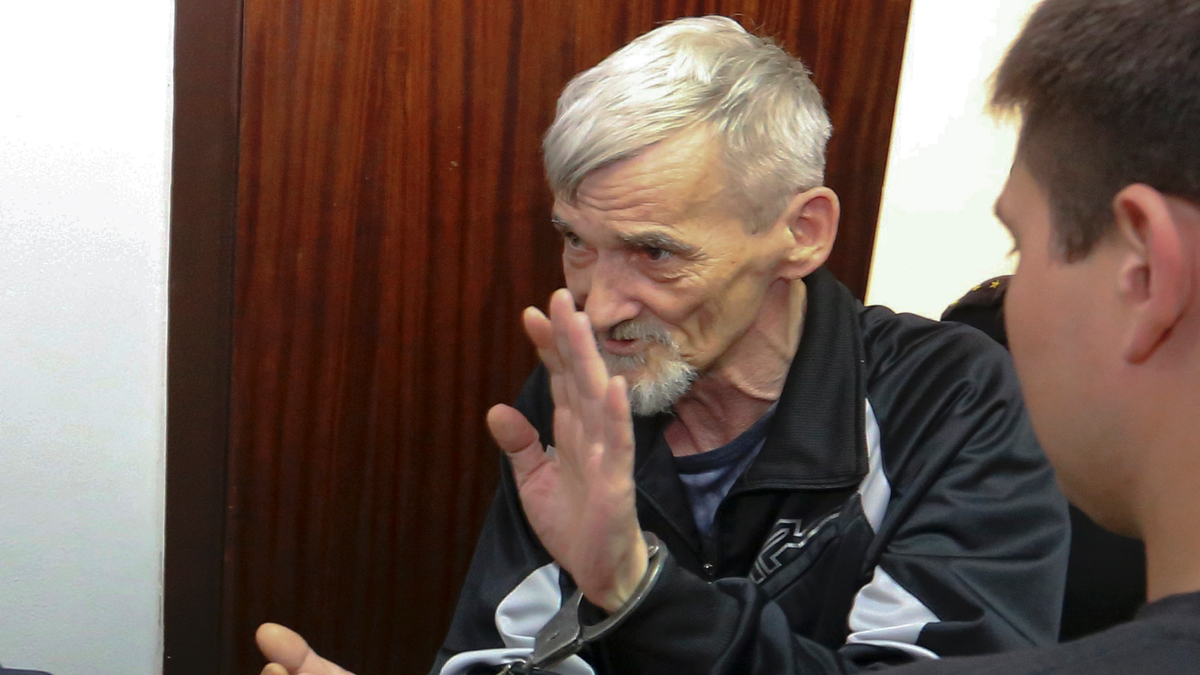
MOSCOW – Russian authorities this week brought fresh legal action against an acclaimed researcher into Stalin's purges, accusing him of sexual misconduct toward his underage daughter, in what human rights groups see as a trumped-up attempt to shut down his work at a time when the government is seeking to gloss over Soviet-era crimes.
Yuri Dmitriyev denies wrongdoing. His arrest Wednesday comes as Russia is hosting the World Cup and trying to showcase cleaned-up cities and stadiums and play down its repressive reputation.
Dmitriyev's older daughter, Ekaterina Klodt, told The Associated Press Friday she believes her father is being persecuted for his research and activism.
"Somebody doesn't like the work that he does," Klodt said.
The arrest was the latest step in a lengthy legal case. Dmitriyev had already spent over a year in jail before being acquitted this spring on child pornography charges, but the acquittal was later overturned.
The initial charges against Dmitriyev, who heads the local branch of the Memorial human rights group, centered on nine photographs of Dmitriyev's adopted daughter discovered on his home computer. Dmitriyev said he was regularly photographing the girl to document her health.
Investigators in the northern region of Karelia, near the border with Finland, said Thursday that Dmitriyev, 62, now faces new accusations of sexually abusing his daughter in 2012-2016. It was unclear what brought on the new accusations and investigators declined to comment.
The European Union questioned the "dubious charges" against him. The case has shocked the Russian human rights community, which sees it as an attempt to discredit his work commemorating Stalin's victims. The country's best-known writers, historians and other public figures have campaigned in his defense. Earlier this year, just released from prison, Dmitriyev was given a prestigious human rights award by the Moscow Helsinki Group.
In 1997, Dmitriyev, a self-taught researcher and ethnographer, discovered a mass grave in the woods of Karelia full of skulls that had holes in them. So began a two-decade-long effort to locate, identify and commemorate more than 9,500 victims assassinated there on Josef Stalin's orders in the 1930s. Through archival work and expeditions in the woods, Dmitriyev turned the unknown killing field into a memorial where the relatives of the dead could finally pay their respects, lay flowers and cry. A giant stone marking the site, known as Sandramokh, is engraved with the words "People Don't Kill Each Other."
"It cannot be that a person would just disappear without a trace. If he was starved to death or executed, the person must have a grave," Dmitriyev said in one video interview before his arrest. "Memory is what makes us human."
Dmitriyev's supporters speculate that he drew local officials' ire when the commemoration events at Sandarmokh started attracting broad public attention. Some experts also believe that because the Russian government today is heavily staffed and influenced by members of security agencies, whose predecessors conducted the purges, Dmitriyev's work is a thorn in their sides.
Writer Dmitry Bykov said Dmitriyev's case is a metaphor for today's Russia.
"If you were to prosecute a saint, of course, don't do it for embezzlement or the fact that he beat someone, but ascribe to him the dirtiest thing possible," he said in a video statement in Dmitriyev's defense. "There is no better testament of the times we live in."
Dmitriyev's legal troubles began in 2016, when police found nearly 200 photos on his hard drive, and nine were deemed pornographic, according to Dmitriyev's lawyer Viktor Anufriyev.
Dmitriyev's colleague, Irina Galkova, observed him and his daughter together three years ago during one of Dmitriyev's expeditions and staunchly disputes the accusations against him.
"On every occasion it was 'Daddy, daddy, daddy,'" Galkina said. "You could see that he was such an important person in her life."
The AP does not identify alleged victims of sexual assault by name.
Dmitriyev, himself an orphan, adopted the girl when she was 3 after his two biological children had grown up. The girl was frail and always hungry, Dmitriyev said in a recent interview. She ate bananas non-stop and shook with anticipation at the sight of pasta.
Dmitriyev started keeping a photo diary of the girl's wellbeing after the staff at her daycare noticed marks on her body and suspected Dmitriyev of beating her. Dmitriyev says the marks were traces of newspaper ink left after he treated his daughter with mustard plasters, a remedy widely used in post-Soviet countries for colds and the flu. The pictures were also a way for Dmitriyev to chronicle her physical development because she was lagging behind her peers in height and weight, he says.
Anufriyev said the pictures show the girl photographed from the front, back and sides. Klodt says the folder in which the photos were kept was named "Health."
The first court-ordered expert evaluation found the photos to be pornographic, but a later one judged they were not. A government psychiatric institute also evaluated Dmitriyev and concluded that he does not have any sexual deviations and is not a pedophile, according to the lawyer.
Lev Scheglov, a medical doctor and sexologist, testified in court that the photos were not pornographic because they are static, show no sexual action or any overt display, touching or handling of private parts.
"If this is pornography, I told the judge that in that case tomorrow we must close all the museums in Russia and the world because they are full of such pornography," Scheglov told the AP.
